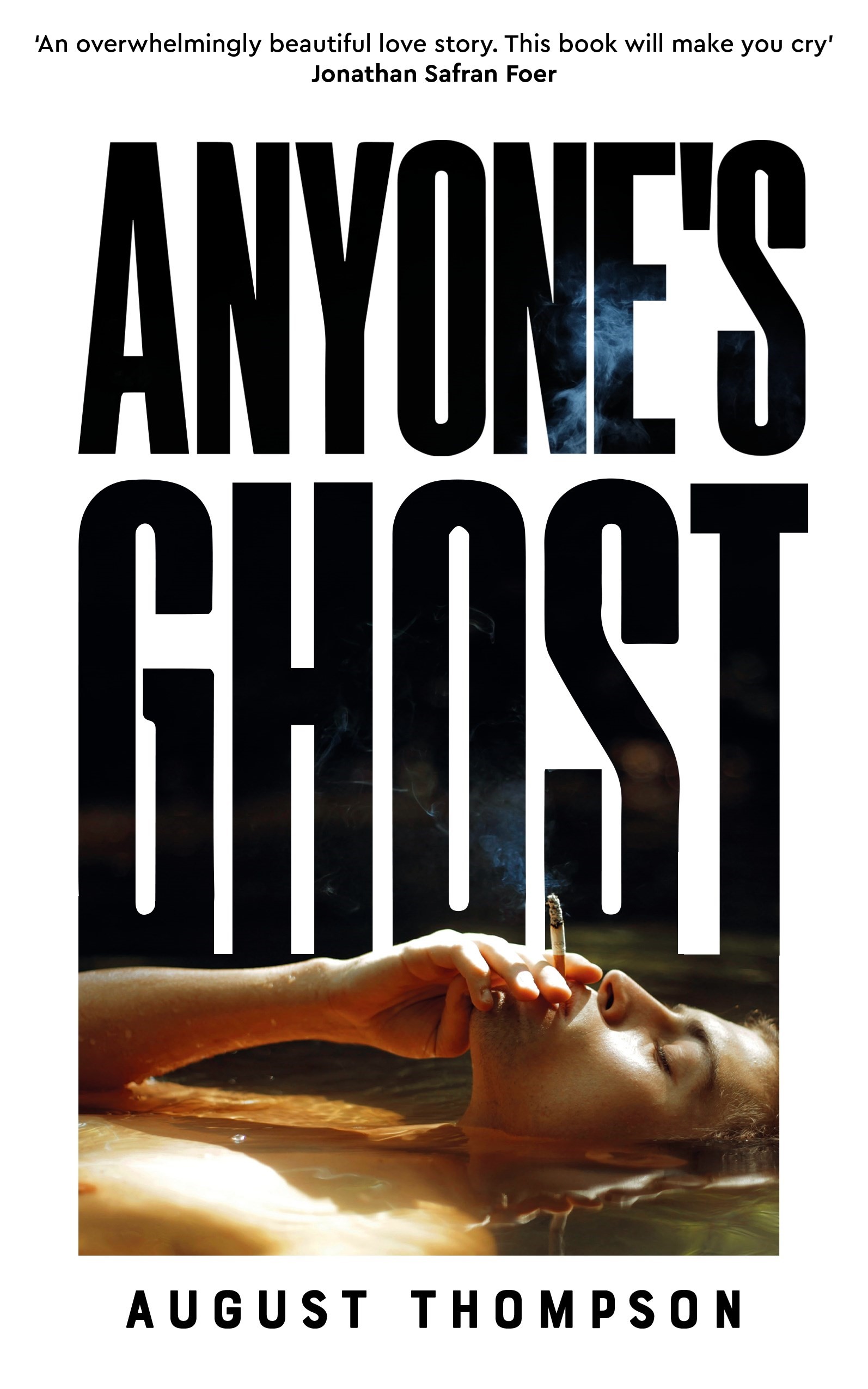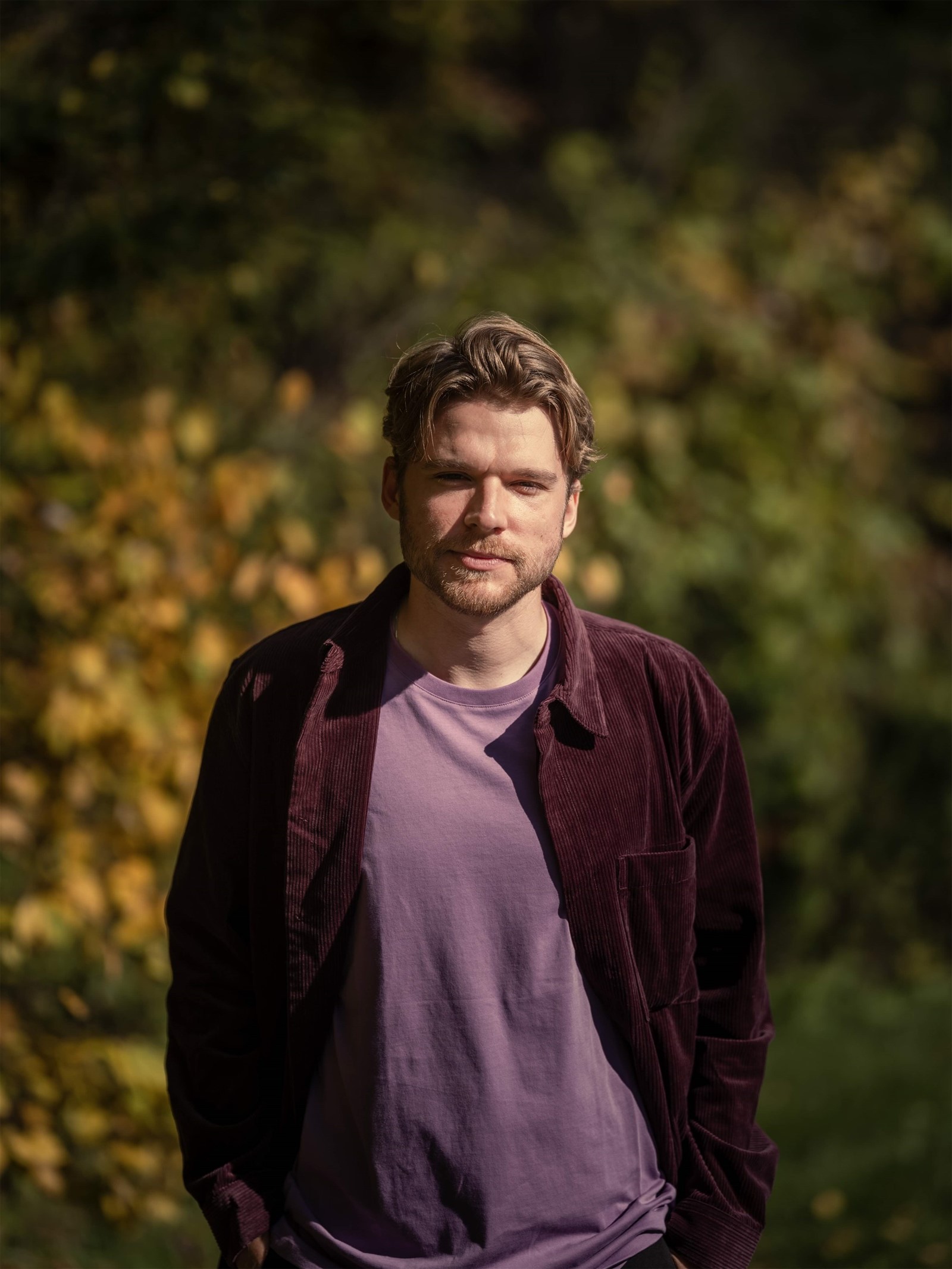No one could accuse August Thompson of opening his debut novel softly. “It took three car crashes to kill Jake,” he writes at the start of Anyone’s Ghost, signposting the tragedy that will befall a main character. By the end, you’ll be so taken by cool, inscrutable Jake and his relationship with younger, nervier Theron that his death feels like a gut punch even though you know it’s coming.
Anyone’s Ghost traces Jake and Theron’s relationship in three parts over 20 years. “The movie Moonlight was very impactful structurally on the book, as was Elena Ferrante’s Neopolitan Quartet [of novels],” says Thompson, speaking over Zoom from his New York apartment. In part one, Jake and Theron meet and become inseparable during a teenage summer in New Hampshire: Jake, 17, is two years older and has an easy charisma that the younger boy seems mesmerised by.
Then in part two, they reconvene in New York six years later. Theron’s sense that their connection may be more than a friendship bubbles to the surface, even though Theron now has a girlfriend, Lou, who finally makes him feel more. Part three is where Theron says goodbye to Jake and grapples with what, exactly, they may have shared.
“There are signifiers from my own life in the book – real locations and real things that I lived through,” Thompson says. “But I didn’t have a Jake. I never really had a romantic experience in my adolescence, and certainly not a queer one. I took some stuff from my own teenage archive, and it was fun paying homage to that, but the plot details are almost entirely unrelated to my life.”
The result is a richly evocative novel that derives power from its own tolerance of ambiguity. Can we ever really know someone else – or indeed, our own selves? Here, Thompson discusses some of the novel’s key themes and its progressive approach towards queerness and masculinity.

Nick Levine: You’ve said the novel explores “what it means to want someone as much as you want to be them”. What do you find fascinating about that kind of attraction?
August Thompson: There are people I’ve met in my life that are so charismatic, it’s like they radiate their own light. This is kind of an insane reference, but I think about Jude Law in The Talented Mr Ripley a lot. He’s fucking awful, but you can’t help but want to be around him. I’ve met a lot of those people, and I noticed there were overarching similarities where they kind of had this death drive. I never felt endangered by them, but it was clear they were sort of comfortable being in proximity to danger.
I think a lot of it was [my] admiring their bravery in being that present, and finding that attractive. You know, I’m a pretty neurotic person and pretty socially anxious, so seeing people who could move beyond that was just so enviable. And because I was closeted for a really long time, until I was like 25, it was easy to confuse the two. My brain would kind of hit a power surge switch where it would be like: “Oh, I must want to be that person. There’s no way that I could be attracted to them because that’s just not part of my personal vocabulary.”
NL: What happened at 25 that made you feel more ready to explore your queerness?
AT: Before then I was in a long-term monogamous relationship with a woman, so I wasn’t doing much exploration in general. But then I started reading and watching a lot more queer media, and it really made me assess, like, “Why am I so attracted to these things?” And suddenly I was freshly single and there was this whole new world out there.
I knew I wanted to explore these feelings in my art, and I didn’t want to take people by surprise. It seemed unfair to have my parents find out I was bi when they read a book about it, like, six years down the line. So I don’t know, it just seemed like the right time. You know, a lot of the book is about how hard these things can be to realise. I’m very envious of people who had these very clarifying moments when they were younger, but I just didn’t. For me, it was kind of about piecing things together, which took a long ass time.
NL: What did you want to say about queerness in this novel? Was the aim really to provide an authentic representation of bisexuality?
AT: That was definitely one of my aims. I did want to write a book that I wish I could have read when I was 17. This sounds lofty, but I think this book could have helped me – or at least a book like this. But I also wanted to explore the kind of questions leading to more questions in terms of my own queerness. I think for a lot of people who don’t identify as gay or straight, there’s this strangeness of, like, some days I wake up and feel more attracted to men, and some days I wake up and feel more attracted to women.
And there’s no cohesion or reason to that. The kind of answerless-ness of that fascinates me. Sometimes I feel like the more I think about it, the less I understand. And you know, maybe the answers will never come. But I wanted to explore how OK it is to really not get it and for that to be kind of an eternal existential question and experience.
“And honestly, it felt like lazy work to say: ‘[Masculinity] is the worst thing in the world.’ ... Why are some parts of masculinity toxic, as people say, and why are some parts beautiful and freeing? That feels way more interesting to me” – August Thompson
NL: The word ‘queer’ is obviously controversial because for some LGBTQ+ people it remains incredibly triggering. But I do think it can be helpful for others because it allows for ambiguity. You don’t have to specify ‘how gay’ you are.
AT: Yeah. I wish so badly it was a term I knew or that was used when I was growing up. Back then, bisexuality was not really a common thing [in the media]. I mean, there’s that famous Sex and the City episode where Carrie questions whether bisexuality even exists and calls it “a layover on the way to Gaytown”.
NL: I feel like someone calls out the awfulness of that episode every week on TikTok. Which is something, at least.
AT: 100 per cent. Sex and the City has many brilliant moments but that is certainly not one of them. You know, I think some people have an issue with the term “bisexuality” because they feel it’s exclusive of things. I don’t view it that way. I don’t think that it means there are only two genders because obviously that’s insane. But it’s a term that’s existed for a long time, and I’m proud to sort of be part of its tradition. But at the same time, I’m also glad there are other terms reflecting the fact gender and sexuality is a spectrum with all these middle grounds.
NL: I was also wondering what you wanted to say about maleness with this novel. To me, Anyone’s Ghost is part of the new vanguard of work moving the conversation on from ‘toxic masculinity’, which has become such a reductive term.
AT: 100 per cent. I mean, in the last ten years, there’s been this idea of treating maleness as evil and femininity as an aspirational thing, which I don’t inherently disagree with. And as a queer, tender person, I did feel really restricted by masculinity. I just didn’t know how to fit in and stuff like that. But there are also parts of it that I unabashedly love. Many of the best relationships in my life are with my straight male friends that I’ve known forever; those moments of fraternity are really special to me.
I think it’s very easy to cast a wide net and be like: “Masculinity is the foundation of everything bad.” Because it certainly has caused a lot of evil in the world. But I think on the micro level, on the intimate level, there’s something really moving about male relationships and I guess I wanted to give that its due. And honestly, it felt like lazy work to say: “This is the worst thing in the world.” I wanted to push myself artistically to examine what the granular differences are. Why are some parts of masculinity toxic, as people say, and why are some parts beautiful and freeing? That feels way more interesting to me.
Anyone’s Ghost by August Thompson is published by Picador, and is out on July 11.
